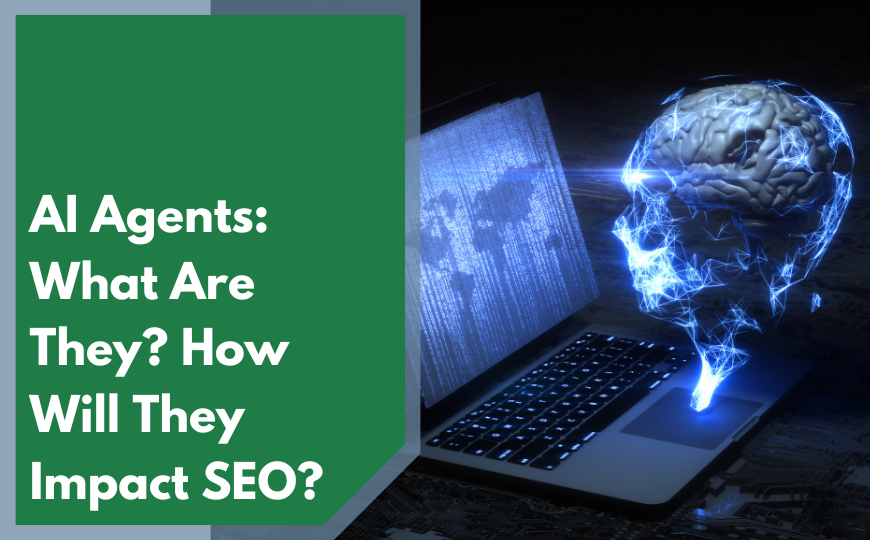AI agents are transforming how users interact with digital environments by combining task execution, conversational abilities, and personalized data synthesis. Unlike traditional search engines that present ranked links, AI agents are built to process queries, synthesize data, and deliver actionable insights with minimal user effort. These AI-driven systems are reshaping how users access information and take action online, which in turn is influencing how businesses must approach content visibility and SEO.
By optimizing for AI agents, your business will be able to maintain visibility in this emerging landscape. As this article will show, by shifting your approach from traditional SEO to AI-driven search methods, you ensure AI agents recognize your content, retrieve your insights, and prioritize your data in real-time.
What Are AI Agents?
AI agents are autonomous digital assistants that go beyond retrieving links. They are designed to execute tasks, make decisions, and personalize user interactions. Unlike traditional search engines that rely on indexed web pages and keyword-based rankings, AI agents process vast amounts of structured and unstructured data to deliver the most relevant response, action, or recommendation based on user intent.
Key AI agent capabilities to be aware of include:
- Conversational Interaction: AI agents respond in natural language, making search experiences more intuitive and reducing reliance on traditional query-based searches.
- Task Execution: AI assistants can book appointments, summarize research, answer complex queries, and even facilitate transactions within their ecosystems.
- Predictive Search Behavior: Unlike search engines that react to queries, AI agents anticipate user needs based on previous behavior, personal preferences, and contextual data.
- Integration with IoT and Smart Devices: AI agents extend beyond search and interact with smart home devices, workplace automation, and business workflows.
How Do AI Agents Impact SEO?
1. AI Agents Optimize for AI-Driven Query Resolution
AI agents prioritize well-structured, authoritative content that can be quickly processed and delivered as a synthesized response. Traditional SEO revolves around keyword targeting and link-building, which will be less relevant in AI-driven search landscapes.
To remain visible, focus your business’s efforts on:
- Structuring content using natural language processing (NLP)-friendly formatting that aligns with how AI understands conversational queries.
- Prioritizing intent-driven content over traditional keyword optimization.
- Developing concise, structured answers that AI agents can pull from directly in response to complex queries.
Because many AI agents generate responses dynamically instead of showing a ranked list of links, your content must be structured in formats that are easily extracted and synthesized in real time.
2. AI Agents Use Structured, Machine-Readable Content
AI agents need structured, machine-readable content to accurately extract information. By implementing schema markup, metadata, and knowledge graphs, your business will have a much higher likelihood of being cited in AI-driven responses.
Key steps to take include:
- Enhancing structured data markup (e.g., FAQ, How-To, Product Schema) to ensure AI agents can quickly interpret website data.
- Creating well-defined entity relationships through internal linking and industry-standard taxonomies.
- Leveraging authoritative sources and citations to improve AI-driven trust signals.
Search engines will increasingly prioritize structured knowledge over unstructured content, making schema-rich optimization essential for AI agent visibility.
3. AI Agents Personalize Responses and User Intent Matching
Unlike traditional SEO that focuses on ranking pages for broad audiences, AI agents personalize responses based on a user’s history, preferences, and contextual signals. This means it’s time to tailor your content strategies for different audience segments and optimize for hyper-personalized AI recommendations.
Steps to improve AI-driven personalization include:
- Using first-party data and behavioral insights to create dynamic, AI-friendly content.
- Structuring content for adaptive search experiences, where AI agents can tailor responses based on past interactions.
- Developing content clusters that guide AI-driven discovery and help build contextual understanding around a subject area.
4. AI Agents Shift from Click-Based Search to AI-Delivered Information
AI agents are reducing the frequency of traditional search result interactions by offering instant, synthesized responses to many types of queries—especially informational or task-based. This shift represents a major disruption for traditional SEO, as fewer users will rely on clicking through to web pages when AI can provide instant responses.
To stay relevant, your business should make sure to:
- Optimize for zero-click search experiences, ensuring your brand is cited in AI-generated summaries.
- Create content that is easily digestible and direct, so AI agents can extract key insights efficiently.
- Build authoritative knowledge bases that AI agents trust and reference in their responses.
Traditional SEO models focus on click-through rates and organic traffic. If you are still using those outdated methods, it’s time to evolve as AI-generated answers replace traditional search result pages.
What is the Future of AI Agents in Search?
1. AI-Powered Business Search Assistants
Enterprise AI search agents are being developed to assist businesses in internal knowledge retrieval, document management, and customer support automation. These tools will integrate AI-powered recommendation engines that personalize search experiences based on your company-specific needs.
2. AI-Driven Ecommerce and Voice Search Expansion
AI agents will increasingly handle ecommerce search, enabling voice-powered transactions and intelligent product recommendations. It’s time that you structure your product catalogs with AI-friendly metadata, real-time pricing updates, and detailed product attributes that align with AI-driven purchasing behavior.
3. AI and Automated Content Generation
As AI-generated content becomes more common, businesses must strike a balance between efficiency and credibility—ensuring content maintains human insight, accuracy, and brand tone. AI-assisted content creation tools will become essential for producing real-time, data-driven insights optimized for AI-powered search agents.
How Prepared is Your Business?
AI agents are fundamentally changing how search works. Instead of traditional ranking systems, AI-driven assistants prioritize structured, intent-focused, and conversational content that aligns with real-time search behavior. If your business fails to adapt, you will lose visibility. However, by optimizing for AI-driven search experiences, your business will become a trusted source for AI-powered recommendations and decision-making.
It’s time to shift your SEO strategies toward AI-first content optimization. Is your brand integrated into AI knowledge graphs, cited in AI-powered responses, and structured for intelligent search assistants?
Secure your visibility in the next wave of AI search innovation by booking an AI SEO Maturity Audit with our expert team at DirectiveGroup today. After analyzing your current capabilities, we offer deep insight and actionable steps that you can take to further secure your business in the AI-driven future.






